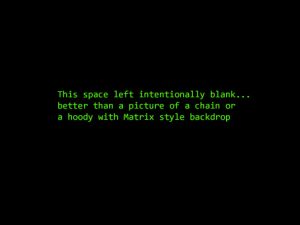- Prologue – covers the overall challenge at a high level
- Part One – Recruiting and Interviews
- Part Two – Threat and Vulnerability Management – Application Security
- Part Three – Threat and Vulnerability Management – Other Layers
- Part Four – Logging
- Part Five – Cryptography and Key Management, and Identity Management
- Part Six – Trust (network controls, such as firewalls and proxies), and Resilience
Recruiting and Interviews
In the prologue of this four-stage process, I set the scene for what may come to pass in my attempt to relate my experiences with fintechs, based on what i am hearing on the street and what i’ve seen myself. In this next instalment, i look at how fintechs are approaching the hiring conundrum when it comes to hiring security specialists, and how, based on typical requirements, things could maybe be improved.
The most common fintech setup is one of public-cloud (AWS, Azure, GCP, etc), They’re developing, or have developed, software for deployment in cloud, with a mobile/web front end. They use devops tools to deploy code, manage and scale (e.g. Kubernetes), collaborate (Git variants) and manage infrastructure (Ansible, Terraform, etc), perhaps they do some SAST. Sometimes they even have different Virtual Private Clouds (VPCs) for different levels of code maturity, one for testing, and one for management. And third party connections with APIs are not uncommon.
Common Pitfalls
- Fintechs adopt the stance: “we don’t need outside help because we have hipsters. They use acronyms and seem quite confident, and they’re telling me they can handle it”. While not impossible that this can work – its unlikely that a few devops peeps can give a fintech the help they need – this will become apparent later.
- Using devops staff to interview security engineers. More on this problem later.
- Testing security engineers with a list of pre-prepared questions. This is unlikely to not end in tears for the fintech. Security is too wide and deep an area for this approach. Fintechs will be rejecting a lot of good candidates by doing this. Just have a chat! For example, ask the candidate their opinions on the usefulness of VA scanners. The length of the response is as important as its technical accuracy. A long response gives an indication of passion for the field.
- Getting on the security bandwagon too late (such as when you’re already in production!) you are looking at two choices – engage an experienced security hand and ignore their advice, or do not ignore their advice and face downtime, and massive disruption. Most will choose the first option and run the project at massive business risk.
The Security Challenge
Infosec is important, just as checking to see if cars are approaching before crossing the road is important. And the complexity of infosec mandates architecture. Civil engineering projects use architecture. There’s a good reason for that – which doesn’t need elaborating on.
 Whenever you are trying to build something complex with lots of moving parts, architecture is used to reduce the problem down to a manageable size, and help to build good practices in risk management. The end goal is protective monitoring of an infrastructure that is built with requirements for meeting both risk and compliance challenges.
Whenever you are trying to build something complex with lots of moving parts, architecture is used to reduce the problem down to a manageable size, and help to build good practices in risk management. The end goal is protective monitoring of an infrastructure that is built with requirements for meeting both risk and compliance challenges.
Because of the complexity of the challenge, it’s good to split the challenge into manageable parts. This doesn’t require talking endlessly about frameworks such as SABSA. But the following six capabilities (people, process, technology) approach is sleek and low-footprint enough for fintechs:
- Threat and Vulnerability Management (TVM)
- Logging – not “telemetry” or Threat intelligence, or threat hunting. Just logging. Not even necessarily SIEM.
- Cryptography and Key Management
- Identity Management
- Business Continuity Management
- Trust (network segmentation, firewalls, proxies).
I will cover these 6 areas in the next two articles, in more detail.
The above mentioned capabilities have an engineering and architecture component and cover very briefly the roles of security engineers and architects. A SABSA based approach without the SABSA theory can work. So an architect takes into account risk (maybe with a threat modelling approach) and compliance goals in a High Level Design (HLD), and generates requirements for the Low Level Design (LLD), which will be compiled by a security engineer. The LLD gives a breakdown of security controls to meet the requirements of the HLD, and how to configure the controls.
Security Engineers and Devops Tools
What happens when a devops peep interviews a security peep? Well – they only have their frame of reference to go by. They will of course ask questions about devops tools. How useful is this approach? Not very. Is this is good test of a security engineer? Based on the security requirements for fintechs, the answer is clear.
Security engineers can use devops tools, and they do, and it doesn’t take a 2 week training course to learn Ansible. There is no great mystery in Kubernetes. If you hire a security engineer with the right background (see the previous post in this series) they will adapt easily. The word on the street is that Terraform config isn’t the greatest mystery in the world and as long as you know Linux, and can understand what the purpose of the tool is (how it fits in, what is the expected result), the time taken to get productive is one day or less.
The point is: if i’m a security engineer and i need to, for example, setup a cloud SIEM collector: some fintechs will use one Infrastructure As Code (IaC) tool, others use another one – one will use Chef, another Ansible, and there are other permutations. Is a lack of familiarity with the tool a barrier to progress? No. So why would you test a security engineer’s suitability for a fintech role by asking questions about e.g. stanzas in Ansible config? You need to ask them questions about the six capabilities I mentioned above – i.e. security questions for a security professional.
Security Engineers and Clouds
Again – what was the transition period from on-premise to cloud? Lets take an example – I know how networking works on-premise. How does it work in cloud? There is this thing called a firewall on-premise. In Azure it’s called a Network Security Group. In AWS its called a …drum roll…firewall. In Google Cloud its called a …firewall. From the web-based portal UI for admin, these appear to filter by source and destination addresses and services, just like an actual non-virtual firewall. They can also filter by service account (GCP), or VM tag.
There is another thing called VPN. And another thing called a Virtual Router. On the world of on-premise, a VPN is a …VPN. A virtual router is a…router. There might be a connection here!
Cloud Service Providers (CSP) in general don’t re-write IT from the ground up. They still use TCP/IP. They host virtual machines (VM) instead of real machines, but as VMs have operating systems which security engineers (with the right background) are familiar with, where is the complication here?
The areas that are quite new compared to anything on-premise are areas where the CSP has provided some technology for a security capability such as SIEM, secrets management, or Identity Management. But these are usually sub-standard for the purpose they were designed for – this is deliberate – the CSPs want to work with Commercial Off The Shelf (COTS) vendors such as Splunk and Qualys, who will provide a IaaS or SaaS solution.
There is also the subject of different clouds. I see some organisations being fussy about this, e.g. a security engineer who worked a lot with Azure but not AWS, is not suitable for a fintech that uses AWS. Apparently. Well, given that the transition from on-premise to cloud was relatively painless, how painful is it to transition from Azure to AWS or …? I was on a project last summer where the fintech used Google Cloud Platform. It was my first date with GCP but I had worked with AWS and Azure before. Was it a problem? No. Do i have an IQ of 160? Hell no!
The Wrap-up
Problems we see in fintech infosec hiring represent what is most likely a lack of understanding of how they can best manage risk with a budget that is considerably less than a large MNC for example. But in security we haven’t been particularly helpful for fintechs – the problem is on us.
The security challenge for fintechs is not just about SAST/DAST of their code. The challenge is wider and be represented as six security capabilities that need to be designed with an architecture and engineering view. This sounds expensive, but its a one-off design process that can be covered in a few weeks. The on-going security challenge, whereby capabilities are pushed through into the final security operations stage, can be realised with one or two security engineers.
The lack of understanding of requirements in security leads to some poor hiring practices, the most common of which is to interview a security engineer with a devops guru. The fintech will be rejecting lots of good security engineers with this approach.
In so many ways, the growth of small to medium development houses has exposed the weaknesses in the infosec sector more than they were ever exposed with large organisations. The lack of the sector’s ability to help fintechs exposes a fundamental lack of skilled personnel, more particularly at the strategic/advisory level than others.



